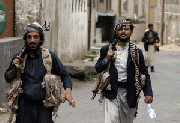
|
| Armed tribesmen loyal to Yemeni tribal leader Sadiq al-Ahmar patrol outside his house in Sanaa May 26, 2011. Dozens of Yemenis were killed in overnight gun battles in the capital, government officials said on Thursday, as fighting aimed at ending President Ali Abdullah Saleh’s three-decade-long rule threatened to ignite civil war. REUTERS/Ammar Awad |
SANAA – Tribal fighters ranged against Yemen’s president Ali
Abdullah Saleh have fought pitched street battles in the capital city killing
more than 40 and raising the specter of a civil war.
On Thursday, residents were fleeing Sanaa by the hundreds,
hurriedly fastening possessions to the roofs of cars, hoping to escape the
violence that has killed more than 70 people since Monday, Reuters news agency
reported.
Fighters in civilian clothes roamed some districts and
machinegun fire rang out sporadically. Sporadic explosions could be heard in
the capital near the protest site where thousands of people demanding Saleh’s
ouster are still camped.
There were long queues at Sanaa bakeries, banks and petrol
stations as residents tried to stock up on cash and food before fleeing to
safer areas in the impoverished state.
The fighting, pitting the security forces of President Saleh
against members of the country’s most powerful Hashid tribe led by Sheikh Sadiq
al-Ahmar, was the bloodiest Yemen has seen since protests began in January.
Arrest order
The Yemeni president ordered the arrest of Sheikh Sadiq
following the deadly clashes.
In a statement issued on Thursday, Yemen’s defense ministry
said Saleh had ordered that al-Ahmar and nine brothers be brought to justice
for “for armed rebellion”.
Dozens of people were killed in overnight gun battles in
Sanaa, while the defense ministry said at least 28 people were killed in an
explosion at an arms storage area.
A government official said that the headquarters of an
opposition television station had been “destroyed”, without giving
details.
Sheikh Sadiq is the leader of the Hashid tribe, which
includes Saleh’s tribe, and has been a vocal opponent of the president, joining
protesters in calling for him to leave power.
The Hashid tribe is one of two main tribal groupings in
Yemen. Alongside the Baqil, it has played a leading role in politics for
centuries.
According to leaked U.S. cables, Sheikh Sadiq, and his
brother Amid, have long wanted to replace Saleh.
And in March, another member of the clan – Yemen army
general – Ali Mohsen al-Ahmar, also threw his weight behind the protesters.
Mohammed al-Qadhi, a Yemeni journalist in Sanaa, told Al
Jazeera that the situation in the city was becoming increasingly tense.
“The government is saying that there was an explosion
at an arms storage plant, but the opposition say that government troops were
shelling residential areas,” al-Qadhi said.
Calling for Saleh’s departure
Meanwhile, leaders of the Group of Eight (G8) powers
attending a summit in France have called on Saleh to quit.
“We deplore the fighting that occurred overnight which
was a direct result of the current political impasse, for which President Saleh
has direct responsibility due to his refusal to sign the Gulf Co-operation
Council (GCC) transition agreement,” a French foreign ministry spokesman said.
The U.S., which has long considered Saleh as an ally in its
fight against al-Qaeda, called on the embattled Yemeni leader to quit.
Hillary Clinton, the secretary of state, said in Paris:
“We continue to support the departure of President Saleh who has consistently
agreed that he would be stepping down from power and then consistently reneged
on those agreements.”
UN secretary-general Ban Ki-moon’s spokesman, Martin
Nesirky, said he called for further peace efforts and an immediate end to the
fighting, while Britain also called for Saleh to sign the exit deal.
No takers for GCC deal
The most recent bout of fighting erupted a day after Saleh
pulled out for the third time from a deal mediated by Gulf Arab neighbors for
him to quit and make way for a unity government.
Pressure has been mounting since February, when protesters
inspired by democratic revolutions in Tunisia and Egypt began camping in
squares and marching in their hundreds of thousands to call for Saleh to go.
His attempts to stop the protests by force have so far
claimed the lives of more than 200 people.
The coalition of opposition parties that has sided with
protesters and was due to sign the deal brokered by GCC held an emergency
meeting on Thursday over what it called Saleh’s “insistence on dragging
Yemen towards civil war”.
“We call on President Saleh to stop the fighting and
answer the demand of the Yemeni people for an immediate and urgent abdication
of power,” the coalition said in a statement.
Saleh had said on Wednesday he would make no more concessions
to those seeking his departure.






Leave a Reply